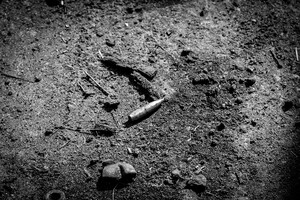Russian soldiers broke into the house of a Ukrainian family, demanding the extradition of “Nazis” and accusing Ukrainians of starting the war.

She called him “the sun”, and he her “kittens”. They met about 20 years ago when she was working at the hospital, and he was young, muscular and handsome and somehow came to fix the roof.
Irina Abramova says that she took the first step and followed him to the place where he went to smoke. They started talking and fell in love, as she says, “Word for word.” But a few weeks ago, this special bond between her and Oleg, as well as everything they built together, was destroyed by one brutal shot.
Irina Abramova told her story to the New York Times. Memories are still too fresh and painful. But at the same time, she still finds it hard to believe that it all happened. On March 5, Russian soldiers attacked her home. They threw a grenade out the window, after which a large fire broke out. She and Oleg were taken outside under the barrel of a machine gun. Oleg was taken outside. His shirt was taken off. He was forced to his knees. The next thing Irina remembers is that she ran up to Oleg, fell to the ground, grabbed his hand. And when she saw the blood near his ears, she felt anger explode in her.
“Shoot me!” she shouted to the Russian soldiers, who hung indifferently over her. She was dressed in a robe and slippers, her house was burning behind her. The woman was holding only one of her cats.
Read also: “Bucha is a landscape of horror”: The New York Times published a map of the killing of civilians
“Shoot me! Come on! Let's! Shoot me and the cat! ” she shouted.
The Russian commander held the machine gun to her chest three times. To this day, Iryna regrets that he never pulled the trigger.
Maybe my destiny is to die tomorrow, “said the Ukrainian, admitting that she thought about suicide.
“It's not easy to take your own life. And so I will not be able to meet my husband in heaven, “she added.
The story of Irina Abramova is the story of Bucha. It is about broken hearts, bloodshed and, above all, about loss. The New York Times reminds that Bucha is a small town near Kyiv, where the greatest Russian atrocities were discovered. With each passing day, new evidence suggests that the scale of the terror and massacres that took place in the city was greater than it seemed yesterday. The Russians killed at least 400 civilians in March, officials said. A few weeks later, they found the bodies of innocent victims.
Human rights organizations and Ukrainian investigators, along with international war crimes experts, are trying to document every killing. Last week, the Ukrainian government published the names and photos of 10 Russian soldiers involved in war crimes in Bucha. Russian troops left the city only a few weeks ago, leaving the ruins behind. Workers are trying to put back the poles that knocked down Russian armored vehicles, as well as repair transformers that were blown up by the Russians. Meanwhile, Bucha residents are forced to survive the conditions of the 19th century, gathering water from wells, using candles at night and cooking over a campfire.
“There is a black fog in the city. The sinister spirit will remain here because so many people were killed thoughtlessly and for no reason, “said Iryna Gres, who lives across the street from Abramova.
” Hello, my sun “
For Irina Abramova, life has become a lonely routine. She says it is difficult for her to survive the day, especially the night, without thinking about revenge, suicide or what she calls “bloody thoughts”. She lost almost everything: her husband, her home, three of her four pets. Family savings have turned to ashes. She doesn't have a single piece of paper to prove her identity.
“I keep asking for something to prove that I am me. But people in the city council say, “How do we know you're you?” The woman says.
Abramova lived all her life in Bucha. The town was considered one of the most attractive in Ukraine with forests and rural comfort. And to Kiev only 45 minutes. Now it is a ghost town. The woman refuses to leave Bucha. “Oleg is still here,” she says.
One of Irina's daily rituals is a trip to the cemetery past peeled birches. She brings her favorite treats for Oleg – cherry lollipops Halls, cookies “Maria”, toffees and chocolate. She lights a cigarette and puts it near the head of the grave. In the evening light, the line of ashes becomes long.
Read also: Bucha massacre: the United States is already narrowing the circle of suspects
“Hello, my sun,” she once said as she stroked a photo of Oleg she had placed on the grave.
In his 40s, he was eight years younger than Irina. And she allows herself a faint smile when she remembers that fact.
“I stole it,” she says.
A few months after the meeting, Oleg and Irina began living together. They married. He took her surname, which is quite unusual, becoming Oleg Alexandrovich Abramov. He persuaded his wife to leave the hospital, promising to provide for the family. The couple had no children. But Irina says they had a perfect family. He worked hard all week as a welder and often came back late when she was already in bed watching TV. On weekends, they fried meat in the yard and sometimes went to the movies at the Giraffe Mall in Irpen. A few weeks ago, this mall was bombed.
“Oleg will not come”
Russian troops entered Bucha shortly after the war began. Strong Ukrainian resistance halted their offensive. On February 27, the Ukrainian Armed Forces smashed a long column of Russian armored vehicles on the street where Irina lives, destroying 20 armored vehicles and an unknown number of Russian soldiers. After that, Oleg became very nervous, – the woman recalls. He felt that the Russians would come for revenge. The man insisted that it was better for them not to leave the house. And they spent many hours on the kitchen floor. As they lay on the floor, she felt him tremble.
“I asked him, 'Are you afraid of death?' And he said, “No, I'm afraid for you,” Iryna recalled.
On the night of March 4, they heard large trucks passing by. The next morning, their house was blown up by a grenade. The shooting began. The gate to their yard was knocked out. Four Russian paratroopers stormed them. Three of them were young. They were maybe 20 years old. The commander was already over 30. Irina says that it was the commander who ordered them and her husband to leave the house. She recalled a conversation with Russian soldiers at their home.
“Where are the Nazis?” – said the commander.
“There are no Nazis here,” Irina replied.
“Where are they?” shouted the Russian military. “They have never been here,” she said. “Tell me the exact addresses,” the Russian insisted.
“We are ordinary people,” Irina said.
But the commander was even angrier.
“We came here to die. Our wives are waiting for us at home. And you started this war. You have elected a Nazi government, he shouted. Irina says that for some reason Russians love this word – “Nazis”. “Has your husband ever taken up arms?”
Read also: I – Bucha: in Brussels, Ukrainian protesters demanded an embargo on oil and gas from Russia
“No,” – said the woman.
“Who does he work for?” – the commander asked.
“Welder”, – Irina honestly admitted, but the Russian military began to walk angrily here and there.
Her father, Volodymyr Abramov, who lives next door, said he and Oleg were being held in the yard. The young soldiers ordered Oleg to take off his jacket, sweater and shirt to check for military tattoos. He did not have them. Oleg never served in the army. Then they took him out of the yard. His last words: “Guys, what are you doing?”.
A minute passed. The fire broke out. Black smoke billowed from the house. And nothing was visible through it. The Russian commander came.
“Where is Oleg?” Irina's father asked in panic. The commander looked at the gate and said: “Oleg will not come.” After these words, Irina ran out into the street.
“I looked to my left. Nothing. She looked to the right. I see my husband on earth. I see a lot of blood. And part of his head is gone. Later I saw other dead people in different poses, “Iryna recalled.
She grabbed her husband's arm and shouted:” Oleg! Oleg! ”
The Russians were sitting on the curb, drinking water from plastic bottles and just looking at me. They did not say anything and did not show any emotions. They were like an audience in a theater, “said Irina.
Her father says that it was then that she” shouted the loudest scream I've ever heard. “
“Shoot me! Shoot me and the cat! ”The woman shouted.
Watch the special topic: could operate only in territories not included in such areas. Danilov believes that the war will be long It depends on many factors. Explosions were heard in Lviv, power substations were damaged Missile strikes were carried out in the region. Transnistria is preparing to evacuate the families of Russian officers – the General Staff of the Armed Forces Units of the Russian Army Task Force in the region are still in full combat readiness. Israel extended tourist visas for Ukrainians until the end of May – embassy The same could happen in June – it all depends on martial law.


